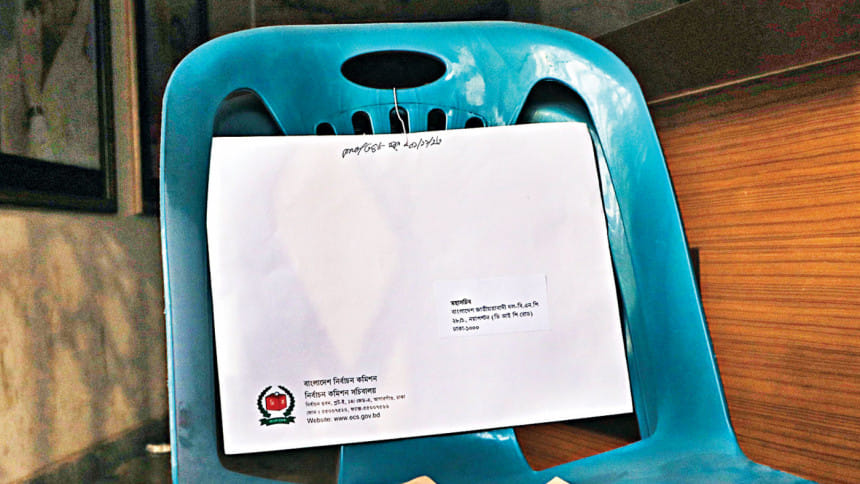EC Talks With Parties: Structured to fall through?

The Election Commission's move to hold dialogue over preparations for the upcoming general election appears doomed to fall flat, as the BNP and its allies won't take part in it and the issue of polls-time government remains unresolved, say political analysts.
They believe the talks, scheduled for tomorrow, with 44 political parties in a single day are nothing but "eyewash", as the participants will get only a few minutes to discuss the electoral and political issues and make their recommendations.
The EC is holding the dialogue with the political parties' top brass or their nominated leaders when it actually seems to have no time for it, they said.
Also, the analysts added, insincerity is writ large as the EC is inviting the BNP when the party's top leaders are either in jail or in hiding.
The BNP and like-minded parties would not be sending anyone to the talks, sources said, adding that Islami Andolon Bangladesh, a major Islamist party, too would not join.
BNP Senior Joint Secretary General Ruhul Kabir Rizvi from an undisclosed location told The Daily Star, "Who will join [the dialogue]? All [ BNP leaders] are either in jail or on the run … If your hands and legs are tied and good food is served, would you be able to eat? Can this Election Commission go beyond the directives of Sheikh Hasina?"
BNP Chairperson Khaleda Zia is in hospital, party Secretary General Mirza Fakhrul Islam Alamgir is in jail, and Rizvi himself is on the run.
Several cases have been filed against the BNP top brass following clashes and incidents over the BNP rally on October 28.
The EC courier yesterday could not even find a leader at the BNP headquarters in Nayapaltan and Khaleda's Gulshan office to hand over the invitation for the talks.
The courier went to the Nayapaltan headquarters, which was locked and heavily guarded by police, in the morning. Unable to find anyone to give the invitation letter, he went to Khaleda's office.
Failing to find anyone there, he returned to Nayapaltan in the afternoon, hung the letter from an empty chair kept inside the collapsible gate of the BNP office and left.
Law enforcers said the courier hung the letter through the gaps of the collapsible gate.
The experts said the EC has to ensure the BNP is at the table for a meaningful dialogue. As an independent and constitutional body, it can ask the government to ensure an environment so that talks can be held with the BNP and other parties waging a movement to restore the caretaker government system.
According to the EC schedule for tomorrow, it will sit with 22 parties, including the Awami League, at 10:30am. It will sit with 22 more, including the BNP and Jatiya Party, at 3:00pm.
"If 44 representatives from 44 political parties talk for 10 minutes, how much time is required? There will be arguments and counterarguments during the talks. Is it possible to have a meaningful dialogue with so many parties in such a limited time?" said former cabinet secretary Ali Imam Majumder.
This dialogue will not bear any fruit and will not be meaningful, he told The Daily Star.
This EC assumed office around two years ago but since then did not take any meaningful initiative to create a level playing field, he said, adding, "… The EC should take initiatives so that a meaningful talk with BNP is ensured."
Shushashoner Jonno Nagorik Secretary Badiul Alam Majumdar said, "It's a dialogue game by the Election Commission, not a real dialogue. It is just an eyewash."
Badiul said the EC alone cannot hold a credible election but it can prevent an election that will not be participatory and credible. He too criticised the EC for its failure to ensure a level playing field for all parties.
A Dhaka University professor, wishing anonymity, said there is a strong possibility the EC's initiative will fail like it did before.
After taking over in February last year, this EC, led by Chief Election Commissioner Kazi Habibul Awal, invited all registered parties for talks twice but on both occasions the BNP refused to join.
The commission also did not implement important recommendations made by eminent citizens and political parties during talks.
Many have doubts about how much the EC can do since the problem is a political one and the EC has all along been saying that it has nothing to do with political matters.


 For all latest news, follow The Daily Star's Google News channel.
For all latest news, follow The Daily Star's Google News channel. 




Comments